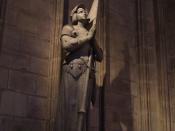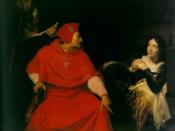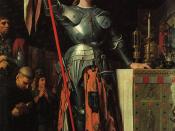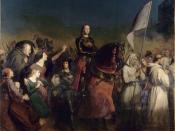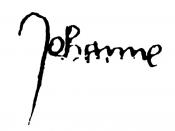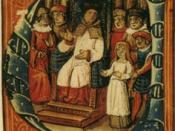Whether you refer to her as Jeanne d'Arc, or as the Maid of Orleans, Joan of Arc is still one of the greatest heroines of history. She defined patriotism to her home country of France and led the French army to victory versus the English invasion during the Hundred Years War.
Joan of Arc was born sometime during the year 1412 in the town of Domremy; the exact date of her birth has been controversial, although some sources say it was on January 6. Her father Jacques Darc was a farmer in Domremy, which was a small town that borders the provinces of Champagne and Lorraine. Her mother's name was Isabelle de Vouthon. She was the mother of five children; Joan was born third among them.
Joan's childhood consisted of tending to her father's herds of cattle and sheep in the fields and learning the basic ideas for farming.
When she was not helping her father work, her mother taught her housekeeping skills, such as cooking, cleaning, and sewing. Her mother also taught her their religion to give her some sort of background to live by.
By the age of thirteen, Joan began hearing the "voices"ÃÂ of saints who she believed were to be sent by God. She claimed to have heard St. Michael, St. Catherine, and St. Margaret. At her trial, Joan explained to the court, "When I was thirteen, I had a voice from God to help me govern myself."ÃÂ The voice was that of St. Michael, who, with St. Catherine and St. Margaret, "told me of the pitiful state of France, and told me that I must go to succor the King of France." The Hundred Years War began in 1339 and lasted through 1453. During the earlier years of the war, from 1339 to about 1380, France had suffered a severe hardship. The defeats continued throughout the late 1300's and early 1400's. Charles VI was the ruler of France at the time when the English, who were led by Henry V, were defeating the French.
Charles VI and Henry V both died in 1422, leaving Henry VI as the king of both Kingdoms.
In the fall of 1428 the English had decided to attack Orleans under the power of Henry VI. Charles VII, who was dominated by Georges de la Tremoille, who lacked money and an army of men, could do nothing. By the spring of 1429 the city appeared to have fallen, as well as the hope of Charles VII.
In April 1429, Joan of Arc was sent by Charles VII to Orleans as captain of a troop of men--not as leader of all his forces. Charles VII was the only one to have seemed to accept Joan and her story of hearing the voices of Saints. His attitude about the whole incident about Joan rewarded him, as well as France as a whole. Joan relieved the city by removing the greatest immediate threat to Charles and for the first time during his reign allowing him a military victory.
While she was defending Compiegne, a town near Paris, in the spring of 1430, Joan was cut off and captured by the Burgandians and turned over to the English in change of money. The English then handed Joan over to the ecclesiastical court at Rouen. At the time, Joan of Arc was considered to be a rich prize if she was captured since she was believed to have practiced witchcraft and heresy, which was a major offense. Charles VII could not do anything about the capturing of Joan. While in the custody of the English, Joan prepared for her trial.
The first trial that was held was on a count of Joan practicing witchcraft and heresy. The judges of this particular trial were Pierre Cauchon, the bishop of Beauvais, and Jean Lemaitre, the vicar of the inquisitor of France, and who were both aided by theologians and lawyers who acted like a jury. The investigation of Joan's case lasted from January 1431 to May of 1431. The "jury"ÃÂ and judges interrogated witnesses of Joan practicing witchcraft and heresy. The actual trial lasted from April to the end of May. The main topic of the trial was over the fact that Joan dressed in male clothing, as well as her actions of heresy and witchcraft. She was told that it was a crime of God to be a woman who dressed like a man by wearing male clothing. She was determined to continue to dress as a man for two reasons. One was the fact that her "voices"ÃÂ did not tell her to change the way she dressed. The other reason was since she was staying in an English prison, her male wardrobe would help to protect her from sexual abuse from the jail guards and other inmates. Her determination was seen as defiance so she finally sealed her fate. Joan was convicted for witchcraft, fraud, technical offenses to the authority of the church (wearing male clothing), and for being a relapsed heretic. Then on May 31st, 1431, Joan of Arc was burned at the marketplace of Rouen.
In 1456, a second trial was held, although Joan of Arc was all ready put to death. She was pronounced innocent of the charges against her. It wasn't until 1909, when she was beatified. Then, in 1920, Joan was canonized a saint by Pope Benedict XV.
Although Joan of Arc has been dead for centuries, her legend lives on. She will always be recognized as a national heroine in France and as a legend to anyone who knows her story. Joan of Arc may be gone, but never will she be forgotten.
